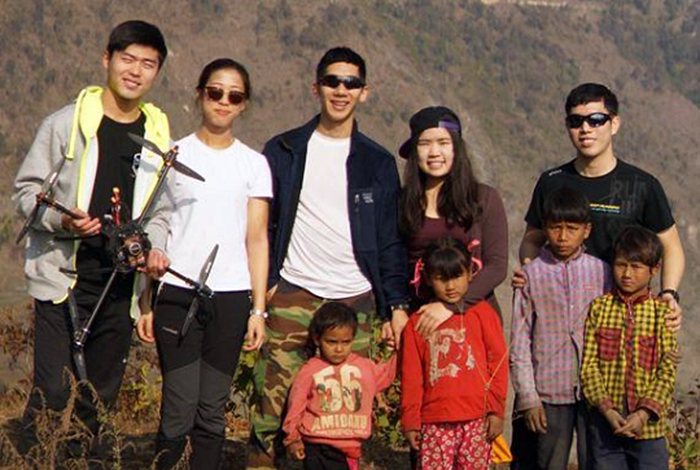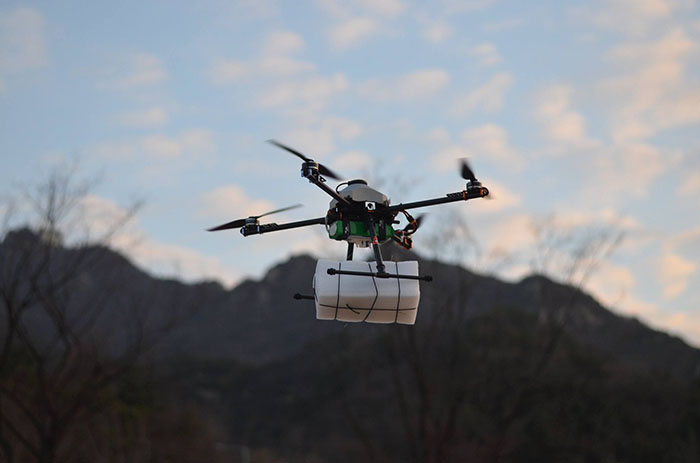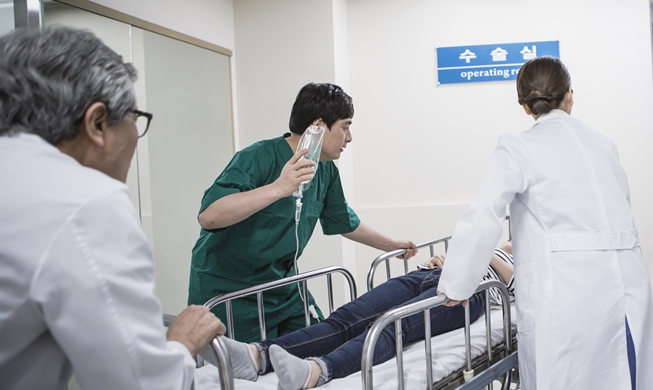
Members of the drone startup Angelswing pose for a picture with children in Nepal. The student company has developed a drone that can deliver medicine to remote villages.
This past January in Nepal, a drone flew above the small village of Narjamandap in Nuwakot District, located about seven hours by car from Nepal's capital Kathmandu.
The drone flew 2 kilometers and was able to deliver a 1-meter cube box to a village. The box contained medical supplies, like vaccines, syringes and painkillers. This was all part of a medical delivery drone project run by the non-profit student startup Angelswing.
Angelswing is a social venture startup established by a group of university students that aims at contributing to society with drones. In April 2015, when Nepal had massive earthquakes, two students who were taking a course on founding startups -- Peter Park who was in Seoul as an exchange student from the Georgia Institute of Technology, and Jeon Suli who was studying politics and diplomacy -- teamed up to help the Himalayan nation.
Their first project was to develop a drone with cameras so that it could take pictures of damaged regions across Nepal and make detailed maps of the regions with its data. The startup says that measuring the scale of the damage was the first step to providing relief to the people or to reconstructing buildings in the damaged regions. It reasoned that a drone could be used to measure this, instead of volunteers who would have to visit every single damaged location on foot, which is both dangerous and time consuming.
Soon, a few more members had joined the team and it undertook its drone project for real. They had to conduct the research all by themselves using books and online sources and find cheap parts online to reduce production costs. After three months of development, they finally came up with a drone that could help make detailed maps. The team then visited Kathmandu and donated their drones to the engineering department at Kathmandu University. The drones were then used to make maps across the damaged regions.

A drone delivering medical supplies and developed by Angelswing goes through a test flight.
The team, which first heard about and then witnessed first-hand the damage when it visited Kathmandu, continued to develop its drone project.
The team decided to develop a drone that could deliver medical supplies to people living in small, remote villages between rugged mountains. These locations cannot be easily reached by medical services and this often leads to the loss of life.
The team focused on developing a drone that could manage the weight of medical products, while also using GPS, cameras and sensors that can measure the altitude. This can help raise the accuracy of dropping the medical box in the right location. They also improved the battery and propeller performance so that the drone could fly for longer. After a couple of test flights, the team finally successfully delivered a box of medical products for about 10 to 20 people for about one month.
This coming March, the team plans to deliver more medical supplies to regions even further afield through a partnership with the Nepali government.
By Chang Iou-chung
Korea.net Staff Writer
Photos: Angelswing
icchang@korea.kr
Most popular
- Korea Welcome Week for foreign tourists set from April 25-May 16
- Korea.net welcomes 2025 K-influencers, Honorary Reporters
- 2025 Honorary Reporter class pledges to spread 'real Korea' worldwide
- Actor Bae Doona's first romcom in decade to hit theaters in May
- US urged to exempt tariffs on Korea in first '2+2' trade talks
